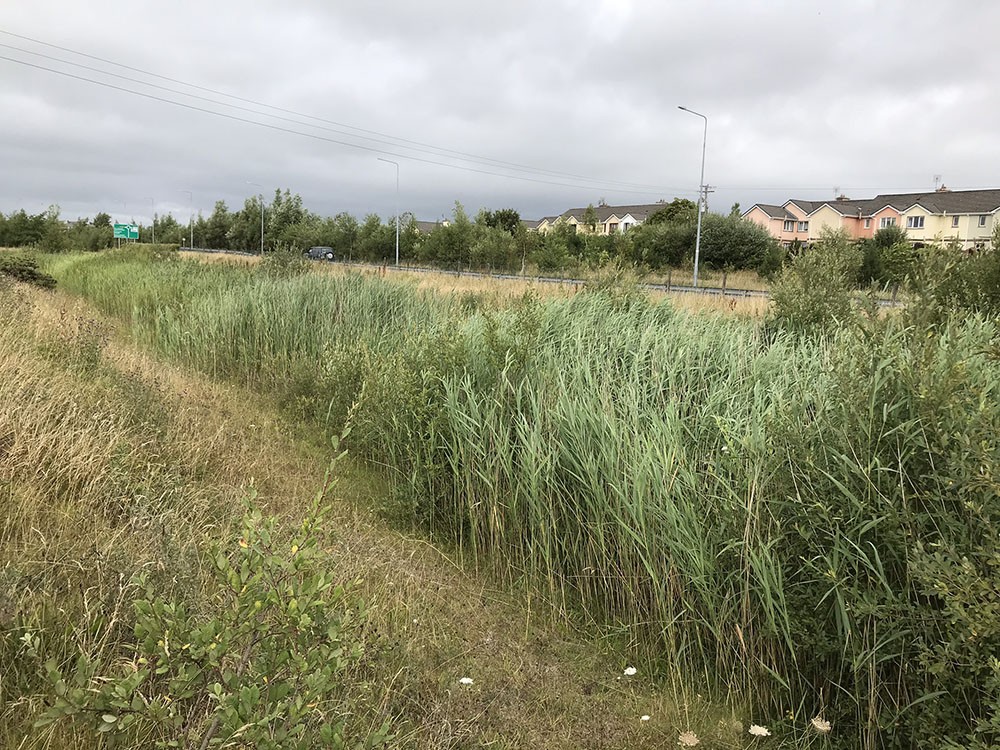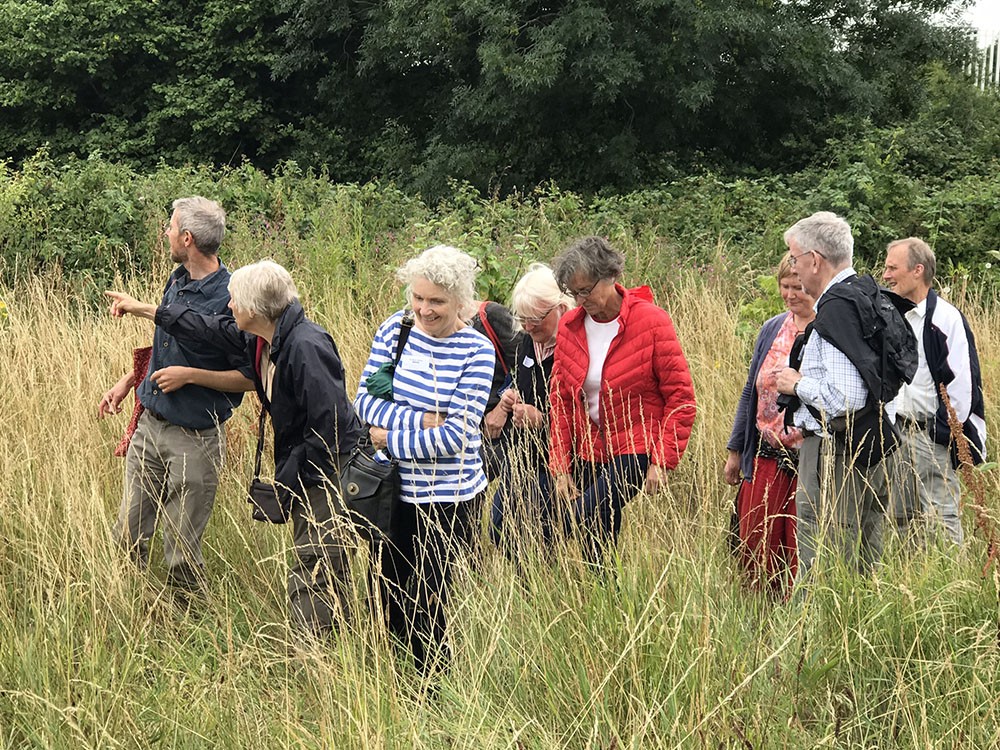By Féidhlim Harty
Every year the Religious Society of Friends (better known as Quakers) in Ireland host their annual conference or IYM (Ireland Yearly Meeting). This year was the first one to be held west of the Shannon, in Limerick Institute of Technology.
Part of the conference involves a series of outings of an ecological or social nature. One of the outings on the agenda for this year was to Ennis, to visit a local community orchard and a county council stormwater wetland for filtering road runoff.
The orchard was planted in the spring of 2017 near the Claureen River as part of a project organised by Garden of Eden Projects Ireland and part funded by Clare County Council and Ennis Tidy Towns. Volunteers came and did the digging, weeding, planting, mulching and contributed more trees, herbs, tree stakes and even bicycle tubes for zero waste tree ties.

There are many different ecological challenges in the world, all interconnected with one another. On the one hand this can sometimes be overwhelming, but on the plus side it means that even a relatively modest local action can have surprisingly far reaching benefits. Environmental and social issues are interlinked with climate change, soils, biodiversity, oceans, stuff and the associated resource and energy use, and money.
To take the new community orchard in Ennis as an example; from a climate perspective the trees sequester carbon as they grow, and the mulching and composting build carbon in the soil, fixing it from the air in the process. Hand in hand with this, our food-miles drop from buying apples from every corner of the globe to zero with our crop of local fruit and nuts.
In terms of biodiversity, the fruit trees provide abundant nectar for pollenating insects and food for the birds and bats that will feed on them in turn. A local bee keeper also has hives nearby which helps with pollination. The soil is enriched by compost and mulch, so the diversity of soil organisms will multiply many-fold from the rather clayey soils we started with. The willows and alders planted in and near the orchard as an early nurse crop will break up the heavy subsoils, enhancing both drainage and moisture-holding capacity over time.
Although the stormwater wetland has more obvious benefits for local waterways, the orchard plays a role too. The trees encourage greater infiltration into the soil, thus reducing surface runoff during heavy rainfall and thus helping to balance water flows in the wider catchment of the Claureen River, as well as filtering the water en route to the groundwater.
Using the orchard as a teaching tool for protecting our oceans may be a bit of a stretch, but even here, as we clean our groundwater and rivers, so too do we protect our oceans. As we combat climate change and reduce plastic packaging waste, we reduce two of the major threats to the seas and marine life.

There is so much stuff in the world, with its habitat impacts, resource use and waste issues at the end of its life. Here the community orchard can help us to reduce packaging and also the resource use associated with transporting food around the world.
Finally how does money cause trouble. In bald terms the more money seems to move, the more damage it seems to do. That’s not always the case, but for the most part it is the rule. This is a much wider issue than there is space to discuss here, but for this discussion about the local orchard, our fruit is free!
So even with a local community orchard of fruit and nut trees plus bushes and herbs, we can have had a direct positive impact on many of the wider ecological challenges that we currently face in the world.
The stormwater wetland near the orchard is one of many roadside stormwater filter wetlands in Co. Clare. These are designed to clean up the pollutants in runoff water and to contain flood water and release it slowly back into the catchment.
Moving on down to the stormwater wetland, our group walked the perimeter of the clay-lined basin, looking at the many plants growing there. The common reed is well known for its use as thatching material; bulrush for its long cigar-shaped heads and yellow flag Iris for its bright daffodil-like flower appearing in wet grassland. All these were planted to help filter the water and more have since colonised in the flooded conditions of the filter system.
Wetlands work in a variety of physical, chemical and biological ways. They slow the flow of water through the wide shallow basin, encouraging grit and fines to settle to the base. The plant stems provide a coarse physical filter. Chemical reactions in the soil help to remove certain contaminants to the air rather than allowing them to flow through to the receiving waters of the Claureen River. Bacteria thrive within the soil and on leaf litter and plant debris, helping to clean the water in essentially the same way as in conventional sewage treatment systems.
Stormwater wetlands also have a hydrological role within the wider catchment. They slow down the flow of road runoff after heavy rainfall thus reducing the potential for both flooding and drought conditions. They also provide wetland wildlife with a valuable habitat, sequester carbon and provide spaces for recreation and beauty within the community.
At a time when climate change is needing urgent attention, stormwater wetlands help in both addressing climate change itself by taking up carbon from the air and also addressing the impacts of climate change flooding within our communities.
If you were to ask what Ennis was most famous for, I’m not sure that the community orchards and stormwater wetland would spring immediately to mind. However they are a wonderful example of environmental projects in our town and the trip was much enjoyed by all the participants.
Féidhlim Harty lives in Ennis and is the founder of Garden of Eden Projects Ireland and director of FH Wetland Systems ltd. Garden of Eden Projects Ireland is looking to team up with local communities who wish to plant community orchards of their own.
Many thanks are due to Clare County Council for their work in facilitating both the Claureen community orchard planting and the Quaker visit to Ennis.
See www.wetlandsystems.ie/gardenofedenproject.html